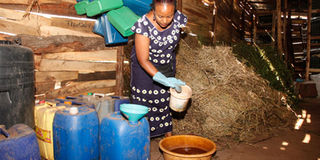Use rabbit urine to repel pests

Joanna Mugisha collects more than 300 litres of rabbit urine which she uses to process folia fertiliser. PHOTO by Rachel Mabala.
Farmers can reduce the money they spend on pesticide by using rabbit urine to wipe out whiteflies, sap-sucking insects that attack crops such as vegetables, coffee, macadamia, bananas and avocadoes, among others.
Alex Maina, who has been a rabbit farmer for more than four years now and has been taping and using the animals’ urine to control the destructive insects on his banana and pawpaw crops, says he has been able to reduce his expenditure on insecticides to almost nil.
“I started using the urine two years ago on my crops to control different pests and diseases and it has proved more effective on whiteflies,” Maina says.
According to Dudutech, an Integrated Pest Management (IPM) company in Africa, insecticides only have a limited effect on whiteflies as most only work when they come in direct contact with the whiteflies and that harsh synthetic chemicals will generally kill all the natural enemies of the whiteflies before they kill the whiteflies themselves
How to use it
It should be noted that rabbit urine can be used in two ways; as a foliar fertiliser and as a pesticide or insecticide.
When used as an insecticide, a farmer would be required to mix two litres of concentrated rabbit urine with three litres of water and spray the mixture on affected crops after every two weeks three times to wipe the insects.
When used as a folia, one would be required to use a litre of concentrated rabbit urine and mixed it with four litres of water and apply it to crops three times every two weeks.
Piloting
Following the effectiveness of the urine in his crops, Maina has since decided to engage more farmers by giving them free rabbit urine to try on their crops especially with farmers owning big coffee, avocado and banana farms.
“I have approached a group of farmers for piloting of this project. Already the feedback from them is encouraging and soon we will be recommending it for wide use in the region hence creating more income for rabbit farmers who would like to tap and sell rabbit urine,” says Maina.
Cost of rabbit urine
Maina, who owns 60 rabbits, says there was a time he used to sell his rabbit urine at Shs1,000 per litre but stopped to sensitise farmers first.
However, currently the urine costs between Shs14,000 and Shs15,000, but companies that have packaged it sell it at Shs20,000 to Shs30,000 per half a litre.
Besides rabbit urine, whiteflies can also be wiped out using organically made neem oil.
“Rabbit urine may repel several pests,” says Joanna Mugisha a rabbit farmer. Mugisha adds value to the urine to make folia fertiliser.
process
To use the fertiliser, one mixes it with water in the ratio of 200ml of manure to 20 litres of water. This can spray an acre of land. The mixture is put in a pump and sprayed on the crops. The spray should be done early in the morning and late in the evening as this is when the stomata are open. The leaves take in the manure directly while the rest is absorbed by the soil.
“Since it is a foliar feed, the spraying should be done at different stages of growth. For instance, in fruits, it should be done at sprouting, colouring and flowering stages,” says Joanna Mugisha.
With time, there will be no need to use fertiliser as the soil will be rich in essential nutrients absorbed from the rabbit urine.
It is advisable that the mixture is used the same day it is made since it has some potent elements that could be harmful. The beauty of it is that rabbit urine has no expiry date as long as it is kept covered after harvesting to preserve ammonia. Mugisha opted for rabbit urine rather than goat or cow due to the ease of harvesting.




